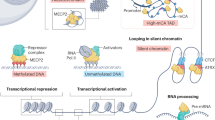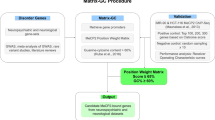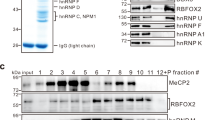Abstract
Rett syndrome (RTT) is a disorder that affects patients’ ability to communicate, move and behave. RTT patients are characterized by impaired language, stereotypic behaviors, frequent seizures, ataxia and sleep disturbances, with the onset of symptoms occurring after a period of seemingly normal development. RTT is caused by mutations in methyl-CpG binding protein 2 (MECP2), an X-chromosome gene encoding for MeCP2, a protein that regulates gene expression. MECP2 generates two alternative splice variants encoding two protein isoforms that differ only in the N-terminus. Although no functional differences have been identified for these splice variants, it has been suggested that the RTT phenotype may occur in the presence of a functional MeCP2-e2 protein. This suggests that the two isoforms might be functionally distinct. Supporting this notion, the two variants show regional and age-related differences in transcript abundance. Here, we show that transgenic expression of either the MeCP2-e1 or MeCP2-e2 splice variant results in prevention of development of RTT-like phenotypic manifestations in a mouse model lacking Mecp2. Our results indicate that the two MeCP2 splice variants can substitute for each other and fulfill the basic functions of MeCP2 in the mouse brain.
Similar content being viewed by others
Log in or create a free account to read this content
Gain free access to this article, as well as selected content from this journal and more on nature.com
or
References
Weaving LS, Ellaway CJ, Gécz J, Christodoulou J : Rett syndrome: clinical review and genetic update. J Med Genet 2005; 42: 1–7.
Chahrour M, Zoghbi HY : The story of Rett syndrome: from clinic to neurobiology. Neuron 2007; 56: 422–437.
Amir RE, Van den Veyver IB, Wan M, Tran CQ, Francke U, Zoghbi HY : Rett syndrome is caused by mutations in X-linked MECP2, encoding methyl-CpG-binding protein 2. Nat Genet 1999; 23: 185–188.
Jones PL, Veenstra GJ, Wade PA et al: Methylated DNA and MeCP2 recruit histone deacetylase to repress transcription. Nat Genet 1998; 19: 187–191.
Chahrour M, Jung SY, Shaw C et al: MeCP2, a key contributor to neurological disease, activates and represses transcription. Science 2008; 320: 1224–1229.
Philippe C, Amsallem D, Francannet C et al: Phenotypic variability in Rett syndrome associated with FOXG1 mutations in females. J Med Genet 2010; 47: 59–65.
Kriaucionis S, Bird A : The major form of MeCP2 has a novel N-terminus generated by alternative splicing. Nucleic Acids Res 2004; 32: 1818–1823.
Mnatzakanian GN, Lohi H, Munteanu I et al: A previously unidentified MECP2 open reading frame defines a new protein isoform relevant to Rett syndrome. Nat Genet 2004; 36: 339–341.
Tress ML, Martelli PL, Frankish A et al: The implications of alternative splicing in the ENCODE protein complement. Proc Natl Acad Sci USA 2007; 104: 5495–5500.
Dragich JM, Kim YH, Arnold AP, Schanen NC : Differential distribution of the MeCP2 splice variants in the postnatal mouse brain. J Comp Neurol 2007; 501: 526–542.
Amir RE, Fang P, Yu Z et al: Mutations in exon 1 of MECP2 are a rare cause of Rett syndrome. J Med Genet 2005; 42: e15.
Bartholdi D, Klein A, Weissert M et al: Clinical profiles of four patients with Rett syndrome carrying a novel exon 1 mutation or genomic rearrangement in the MECP2 gene. Clin Genet 2006; 69: 319–326.
Chunshu Y, Endoh K, Soutome M, Kawamura R, Kubota T : A patient with classic Rett syndrome with a novel mutation in MECP2 exon 1. Clin Genet 2006; 70: 530–531.
Quenard A, Yilmaz S, Fontaine H et al: Deleterious mutations in exon 1 of MECP2 in Rett syndrome. Eur J Med Genet 2006; 49: 313–322.
Ravn K, Nielsen JB, Schwartz M : Mutations found within exon 1 of MECP2 in Danish patients with Rett syndrome. Clin Genet 2005; 67: 532–533.
Fichou Y, Nectoux J, Bahi-Buisson N et al: The first missense mutation causing Rett syndrome specifically affecting the MeCP2_e1 isoform. Neurogenetics 2009; 10: 127–133.
Saunders CJ, Minassian BE, Chow EW, Zhao W, Vincent JB : Novel exon 1 mutations in MECP2 implicate isoform MeCP2_e1 in classical Rett syndrome. Am J Med Genet A 2009; 149A: 1019–1023.
Luikenhuis S, Giacometti E, Beard CF, Jaenisch R : Expression of MeCP2 in postmitotic neurons rescues Rett syndrome in mice. Proc Natl Acad Sci USA 2004; 101: 6033–6038.
Giacometti E, Luikenhuis S, Beard C, Jaenisch R : Partial rescue of MeCP2 deficiency by postnatal activation of MeCP2. Proc Natl Acad Sci USA 2007; 104: 1931–1936.
Jugloff DG, Vandamme K, Logan R, Visanji NP, Brotchie JM, Eubanks JH : Targeted delivery of an Mecp2 transgene to forebrain neurons improves the behavior of female Mecp2-deficient mice. Hum Mol Genet 2008; 17: 1386–1396.
Kumar A, Kamboj S, Malone BM et al: Analysis of protein domains and Rett syndrome mutations indicate that multiple regions influence chromatin-binding dynamics of the chromatin-associated protein MECP2 in vivo. J Cell Sci 2008; 121: 1128–1137.
Guy J, Hendrich B, Holmes M, Martin JE, Bird A : A mouse Mecp2-null mutation causes neurological symptoms that mimic Rett syndrome. Nat Genetic 2001; 27: 322–326.
Ballas N, Lioy DT, Grunseich C, Mandel G : Non-cell autonomous influence of MeCP2-deficient glia on neuronal dendritic morphology. Nat Neurosci 2009; 12: 311–317.
Kerr B, Alvarez-Saavedra M, Saez MA, Saona A, Young JI : Defective body-weight regulation, motor control and abnormal social interactions in Mecp2 hypomorphic mice. Hum Mol Genet 2008; 17: 1707–1717.
Collins AL, Levenson JM, Vilaythong AP et al: Mild overexpression of MeCP2 causes a progressive neurological disorder in mice. Hum Mol Genet 2004; 13: 2679–2689.
Kashi Y, King D, Soller M : Simple sequence repeats as a source of quantitative genetic variation. Trends Genet 1997; 13: 74–78.
Alvarez-Saavedra M, Saez MA, Kang D, Zoghbi HY, Young JI : Cell-specific expression of wild-type MeCP2 in mouse models of Rett syndrome yields insight about pathogenesis. Hum Mol Genet 2007; 16: 2315–2325.
Maezawa I, Swanberg S, Harvey D, LaSalle JM, Jin LW : Rett syndrome astrocytes are abnormal and spread MeCP2 deficiency through gap junctions. J Neurosci 2009; 29: 5051–5061.
Samaco R, Fryer J, Fyffe S, Chao HT, Zoghbi H, Neul JL : A partial loss of function allele of Methyl-CpG-Binding Protein 2 predicts a human neurodevelopmental syndrome. Hum Mol Genet 2008; 17 (12): 1718–1727.
Rastegar M, Hotta A, Pasceri P et al: MECP2 isoform-specific vectors with regulated expression for Rett syndrome gene therapy. PLoS One 2009; 4: e6810.
Acknowledgements
We greatly appreciate the gift of MeCP2-e1-myc and EGFP-MeCP2-e2 cDNAs from Drs Berge Minassian (The Hospital for Sick Children, Canada) and Shinichi Kudo (Hokkaido Institute for Public Health, Japan), respectively. We thank the CECS mouse facility for animal transgenesis and care. This work was supported by FONDECYT (Grants 1061067, 1051079 and 11070237). CECS is funded by the Chilean Government through the Centers of Excellence Base Financing Program of Conicyt.
Author information
Authors and Affiliations
Corresponding author
Ethics declarations
Competing interests
The authors declare no conflict of interest.
Additional information
Supplementary Information accompanies the paper on European Journal of Human Genetics website
Supplementary information
Rights and permissions
About this article
Cite this article
Kerr, B., Soto C, J., Saez, M. et al. Transgenic complementation of MeCP2 deficiency: phenotypic rescue of Mecp2-null mice by isoform-specific transgenes. Eur J Hum Genet 20, 69–76 (2012). https://doi.org/10.1038/ejhg.2011.145
Received:
Revised:
Accepted:
Published:
Issue date:
DOI: https://doi.org/10.1038/ejhg.2011.145
Keywords
This article is cited by
-
Transcriptional Inhibition of the Mecp2 Promoter by MeCP2E1 and MeCP2E2 Isoforms Suggests Negative Auto-Regulatory Feedback that can be Moderated by Metformin
Journal of Molecular Neuroscience (2024)
-
Methyl-CpG-Binding Protein 2 Emerges as a Central Player in Multiple Sclerosis and Neuromyelitis Optica Spectrum Disorders
Cellular and Molecular Neurobiology (2023)
-
Dendrimer-mediated delivery of N-acetyl cysteine to microglia in a mouse model of Rett syndrome
Journal of Neuroinflammation (2017)
-
Clinical and biological progress over 50 years in Rett syndrome
Nature Reviews Neurology (2017)
-
Transcriptional Regulation of Brain-Derived Neurotrophic Factor (BDNF) by Methyl CpG Binding Protein 2 (MeCP2): a Novel Mechanism for Re-Myelination and/or Myelin Repair Involved in the Treatment of Multiple Sclerosis (MS)
Molecular Neurobiology (2016)



